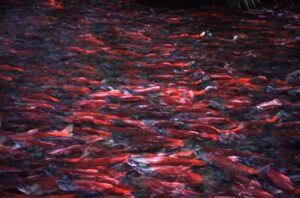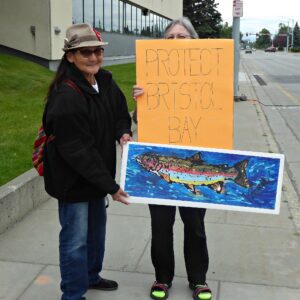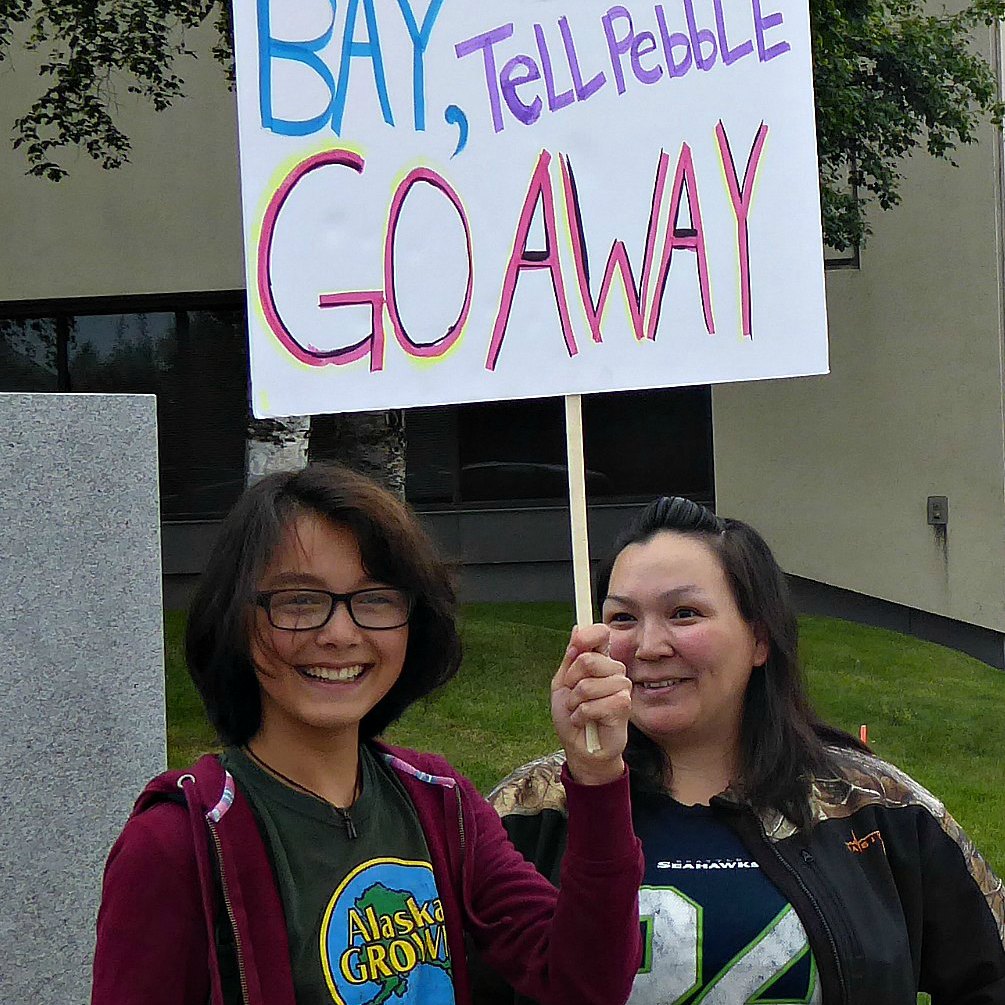
13-year-old tells EPA to protect Bristol Bay
Emily Charles organized a protest outside the Anchorage office of the Environmental Protection Agency in early August. The middle school activist invited people to join her in opposing the Pebble mine. A handful of protesters stood beside her as drivers honked in support and passersby thanked her for speaking out. Here’s what Emily said about why she organized the protest, and what happens when a 13-year-old tells EPA to protect Bristol Bay.
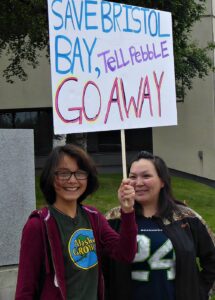
Emily and her aunt Mary Charles outside the EPA offices in Anchorage where the 13-year-old tells EPA to protect Bristol Bay.
Alaska families rely on Bristol Bay
I decided to organize the protest because I wanted to stand up against the proposed Pebble Mine, and the dealings between the EPA and the mine. I felt I should voice my opinion.
I’m Yupik Eskimo on my mom’s side of the family. My mom and Uppa are from Bethel, my grandma from Hooper Bay, and my Great Uppa is from Nelson Island. My family and culture rely on subsistence in Bristol Bay. Salmon fishing is a major part of that. I want a healthy Bristol Bay so that old and new generations can enjoy and live there.
Mine pollution harms many victims
If Pebble were to build even the smallest mine, it would create enough waste to fill a professional football field 880 times. Its largest mine would fill it 39,000 times. Even if all that waste could be somehow contained in ponds for a while, some of it would eventually escape.
Bristol Bay and its salmon are sensitive to pollutants. If the salmon are poisoned, the people and animals that eat them will be poisoned, too. Pollutants that go out to sea would affect sea life. Ocean currents carry pollutants long distances, so the waste would affect other ecosystems.
Salmon would not be the only victim.
Bristol Bay should have final word
The majority of Alaskans oppose Pebble Mine, and they have good reason.
I wanted to host this protest so that more people will see that the Pebble Mine is still a threat—especially with Trump and Pruitt in office—even though the mine was stopped in 2014.
Pruitt made deals with the mining company and is trying take away the protections proposed by the EPA. As people who live in Bristol Bay, we rely on salmon and share a common culture.
Decisions made by a few people who probably have no experience with the region could hurt a lot of people and wildlife. That’s why I believe Alaskans and Bristol Bay residents should have the final word on the proposed Pebble mine. Our interests should be put before the profits of a foreign company.
Activism runs in the family
I think my Uppa (grandpa) Frank Charles inspired me to make my voice heard. He was an activist. He worked for Calista Corporation. He worked on many projects, including the Donlin Gold mine. He worked hard to make sure that the mine was environmentally safe because he had a passion for protecting nature, especially salmon.
My Uppa consulted with elders and was not afraid to oppose government officials and company managers. If he felt their actions were harmful, he spoke up.
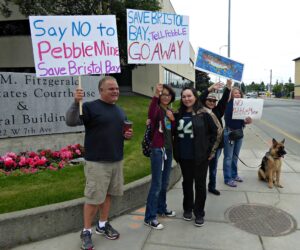
A family that protests together: Emily stands between her dad Michael Gallegos and her aunt Mary Charles.
I, too, feel passionate about nature and wildlife. I, too, want to protect it.
Honks and words of encouragement
The protest against the Pebble mine went well. About 10 people came and stood on the corner. Many people showed support by honking.
My aunt Mary and I were directed into the Anchorage Federal Building and the EPA offices to speak with Dianne Soderlund, the director, and Tami Fordham, deputy director. They were friendly and welcoming.
When I asked them how they personally felt about the mine, they told me that the EPA and its staff couldn’t say if they’re for the mine or against it. They said the EPA does lots of analysis on the Bristol Bay area and how the mine can affect it. They mostly wanted to encourage me to keep voicing my opinion.
Take action now: Alaskans can speak out now to protect Bristol Bay
I told them I feel strongly about protecting the environment and wildlife. I told them that my Yu’pik culture needs healthy salmon. My aunt Mary Charles spoke to them, too. I felt very nervous and anxious while talking, but I pushed it down and tried my best to speak clearly.
Protesting is important because anyone can voice their thoughts and we don’t have to settle for rules, either political, social, or environmental rules that we feel are unfair. I want to become a biologist, artist, and environmental activist.
This world needs a lot of change, so I will be organizing more events in the future and encouraging others to be a part of the movement.
About the author: Emily Charles has gone to school in Alaska and Colorado. She will finish middle school in Hawaii and return to Alaska next year. She plans to attend West High School in Anchorage. Many of her relatives rely on subsistence hunting and fishing in Bristol Bay. Salmon is a major part of Emily’s and her family’s Yu’pik culture. Emily and her grandmother do a lot of salmon fishing in Ship Creek and the Kenai Peninsula. Emily plans to keep doing activist work. Organizing rallies and events can get stressful, she said, but she signs petitions and stays up on current events. News on the environment can get depressing, she said, so she tries to focus on positive news and positive thinking.



